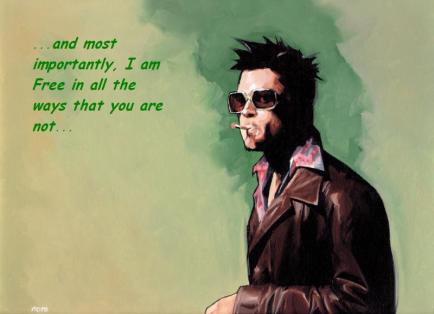This post is an introduction to a new series of posts I am working on, and features some excerpts from Haruki Murakami’s ‘Kafka by the Shore’.
I have a theory. I’ve been realising lately that certain books and authors have had a much bigger effect on my life than I appreciate. I’m not sure I would have tried an iota of the things I’ve been doing in the last few years if it weren’t for their influence. So while Murakami has not influenced me to do any one thing I can put my finger on, he did help me fall in love with the Japanese, and his work is always an education. (Future posts in this series dedicated to individual Authors will be more literally cause-and-effect).
As Abi King of insidethetravellab.com pointed out in her talks at TBUMBR, words can be very powerful. They’re a one-to-one conversation between author and reader, where you can transport them into another time or place, and they’ve been known to start wars and revolutions.
I feel like Every book I read widens my perspective, adding another persons’ opinion to my thinking, allowing me to explore more of the world as they see (or write) it. In fact, over time, my thinking has been adjusted drastically by the powerful and educated voices I have been drawn to – in novels, newspapers, journals. And in the last few years I’ve found it harder and harder to talk to the people around me, about the things I really care about.

This is not me.
Why? Well, my theory is that we live in different worlds. You wouldn’t expect to have a lot in common with somebody from a different walk of life, and in effect, that’s what we are. The people in my ex day-to-day world have a different set of goals, worries, and motivations, to me. Every time I pick up a book that interests me, the divide between us increases, because we don’t share the same set of assumptions or (apologies) limitations. For a while we had our daily activities in common, but even those I had started rejecting a couple of years before quitting them altogether.
A lot of the people I am thinking of do read as well, but evidently we don’t read the same things. Maybe the phenomenons of auto-hypnosis, positive thinking, and self-confidence are at play. Two people can see the same thing and understand different truths, each biased by their own beliefs. Trivial case in point, my interpretation of a BBC ‘Politics’ advert versus the opinion of the thread author, who actually wrote to the BBC to complain. So, I think it is mainly what I’ve been reading that’s made the difference, but maybe how I’ve been reading it has contributed as well.
Reading Murakami for instance, is being thrown into a chaotic lesson in history, music, mythology, philosophy, human emotion, and Japanese culture. He leads me on delicately sculpted tours of his psyche, and impresses me with stunning vistas of learning. In contrast, the latest Patricia Cornwell or a bit of J.K. Rowling, are ‘pleasant’, or ‘entertaining’. If anyone mentions twilight, I will find out where you live.
Somebody I was recommending a book to once said “oh wait, is that fiction? I only read things that are real”, with a look of distaste. I see what you’re trying to do there – you’re implying that you are too cultured to bother with pointless fantasy stories, that should be either in the childrens section, or the bin. The fact that only the day before they had happily waffled on for an hour, about TV shows and films they saw at the cinema (including sci-fi), was lost on them. The power of metaphor my dear, the power of metaphor.
But in the last couple of years, after deciding to walk the walk – of talk I had previously only talked – it’s been amazing to meet people with opinions and ideas I can really relate to again. Now, everywhere I go, I find people engaged in similar journeys, with similar doubts about the follies of mankind, and people willing to debate ‘death and taxes‘.
I was originally introduced to Murakami in the small English-reading section of a Japanese book shop. I made a grab for ‘Kafka on the Shore’ purely because of my love for Franz Kafka’s novels. A read of the author bio and a synopsis or two, led to me buying ‘Hard-boiled Wonderland and the End of the World’ (described as the most Kafka-esque). If I wasn’t travelling, I would have bought several of Murakami’s books there and then, but as the latter novel is considerably slimmer, it won out. (I do own a Kindle but have resisted using it, so far!)

Kafka Memorial Statue, Prague
So here I present a few text bites that I found aesthetic from the latest book I finished reading, ‘Kafka on the Shore’. I tried to keep these short without losing their meaning, but I could happily copy out whole chapters of the book that also kept me smiling or captive throughout. No spoilers included.
From Chapter 19;
“I’ve experienced all kinds of discrimination,” Oshima says. “Only people who’ve been discriminated against can really know how much it hurts. Each person feels the pain in his own way, each has his own scars. So I think I’m as concerned about fairness and justice as anybody. But what disgusts me even more are people who have no imagination. The kind T.S. Eliot calls ‘hollow men’. People who fill up that lack of imagination with heartless bits of straw, not even aware of what they’re doing. Callous people who throw a lot of empty words at you, trying to force you to do what you don’t want to. Like that lovely pair we just met.” He sighs and twirls the long, slender pencil in his hand. “Gays, lesbians, straights, feminists, fascist pigs, communists, Hare Krishnas – none of these bother me. I don’t care what banner they raise. But what I can’t stand are hollow people. When I’m with them I can’t bear it, and end up saying things I shouldn’t. … Do you know why that’s a weak point of mine?”
“‘Cause if you take every single person who lacks imagination seriously, there’s no end to it, ” I say.
From Chapter 24;
“You’re a really healthy person, aren’t you?”
“Yes, Nakata is. I can’t read, but I’ve never had a single cavity and don’t need glasses. I never have to go to the doctor, either. My shoulders never get stiff, and I take a good dump every morning.”
“Isn’t that something,” the maid said, impressed. “By the way, what’s on your schedule for today?”
“We’re headed West,” Nakata declared.
“West,” she mused. “That must mean you’re going towards Takamatsu.”
“I’m not so bright and don’t know geography.”
“Anyway, Gramps, why don’t we go over to Takamatsu?” Hoshino chimed in. “We can work out what’s next after we get there.”
“All right. Let’s go to Takamatsu, then. We’ll work out what’s next after we get there.”
“Sort of a unique style of travelling, I must say,” the maid commented.
“You got that right,” Hoshino said. [So did I. PP]
From Chapter 32;
This one is just a phrase I liked the sound of – a bit like the famous phrase ‘cellar door‘. Yes, I got that from Donnie Darko, I’m not well read on American literature much. Obviously this turn of phrase may not have been intended by Murakami when he wrote the book in Japanese, but he does worked closely with his English translators, so maybe it is intended.
Nakata set off down the hall, plastic bag with washbag inside in hand, to the communal sinks. …
… Finished, he took his plastic bag with washbag inside back to the room.
And from the last chapter;
Time weighs down on you like an old, ambiguous dream. You keep on moving, trying to slip through it. But even if you go to the ends of the earth, you won’t be able to escape it. Still, you have to go there – to the edge of the world. There’s something you can’t do unless you get there.
More eloquent than what Bowie said.
Picking up Kafka’s complete novels again, I also found a beautiful metallic bookmark in it from South Korea that I had been using. A tourist info place in Gyeongju was selling them and I bought several different ones as gifts.
Murakami often criticises or applauds authors, philosophers, and musicians in his work, which gives an intriguing glimpse into his own influences. So as Kafka influenced Murakami, Murakami and Kafka now influence me – and millions of others, but there’s nothing better than a delusion of grandeur!! 🙂
PP.








Murakami is always a great read, although I have found that his book Kafka on the Shore was most difficult for myself to grasp so far.
Have you read Norwegian Wood? Now a major motion picture (always annoying). It is the least surreal and convoluted of his novels I have read yet, or I could say it is the most frank story about human emotion. Hardboiled Wonderland on the other hand… might cause drooling and rocking in the corner.
Haha…I burst out laughing when I read your reaction to Norwegian Wood being made into a movie — my feelings exactly. Norwegian Wood is actually my favorite out of Murakami’s books. I also recommend “The Elephant Vanishes” and “Blind willow, Sleeping woman”, his compilation of short stories. Hardboiled Wonderland is still on my list of Murakami reads!
Thanks, I haven’t read any of your recommendations yet!
Pingback: Peter Parkorr's 2012 roundup: Twelve 'Top' Posts on Travel Unmasked